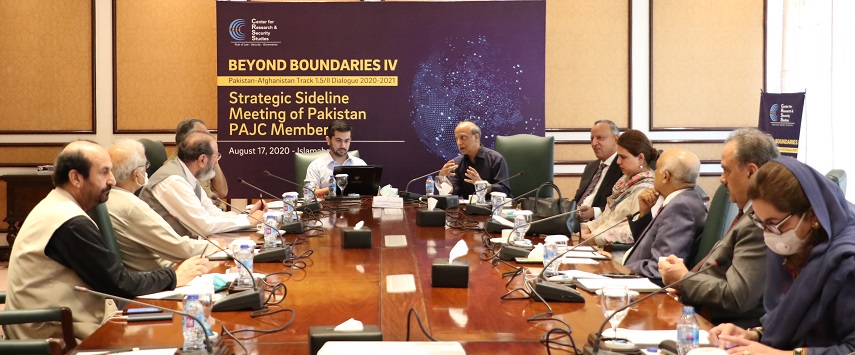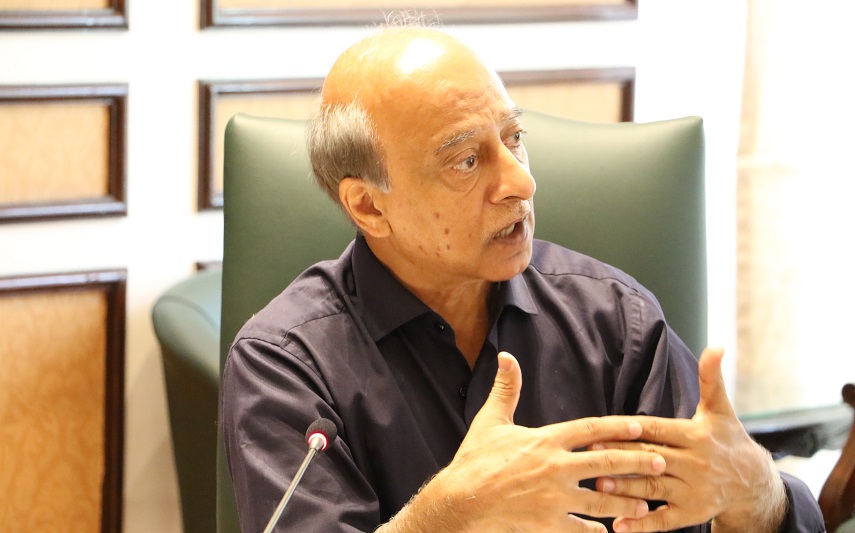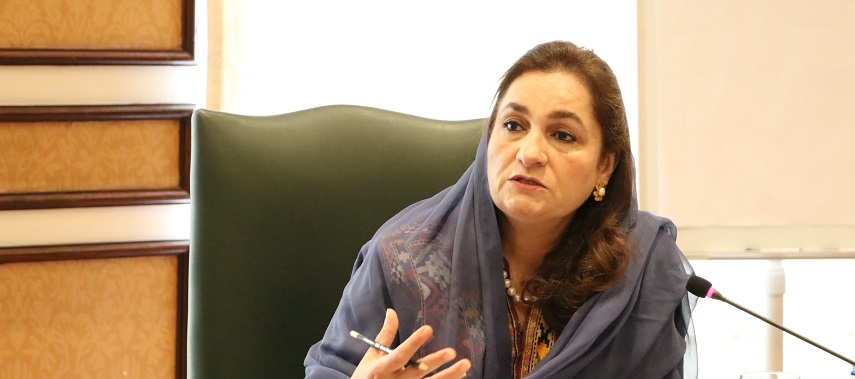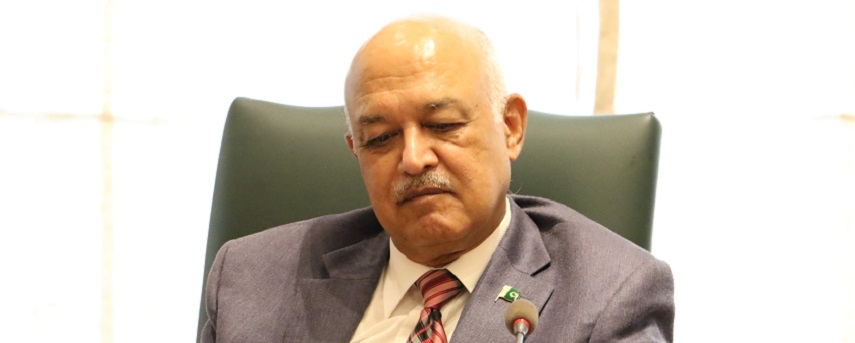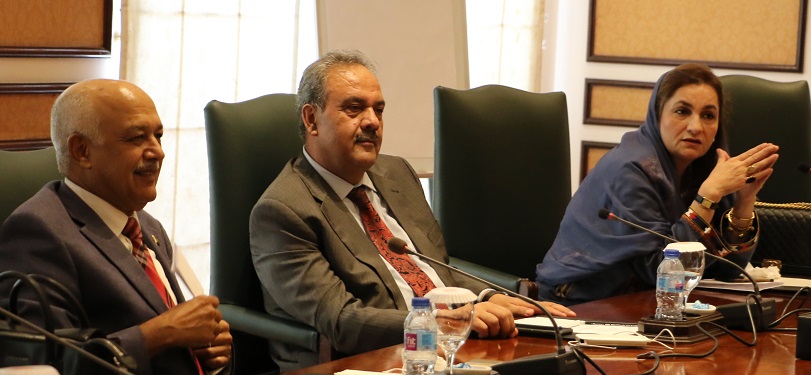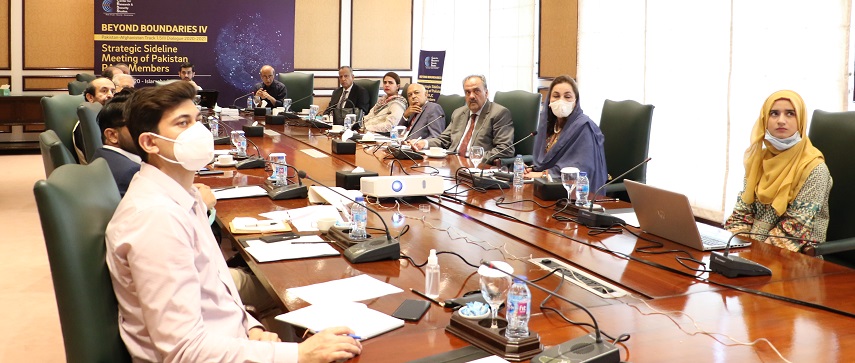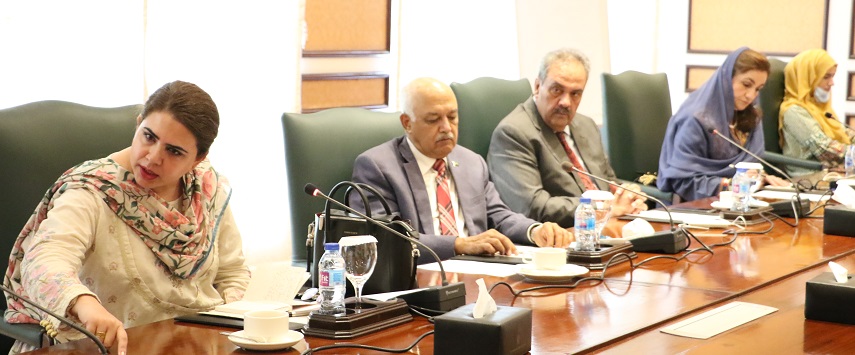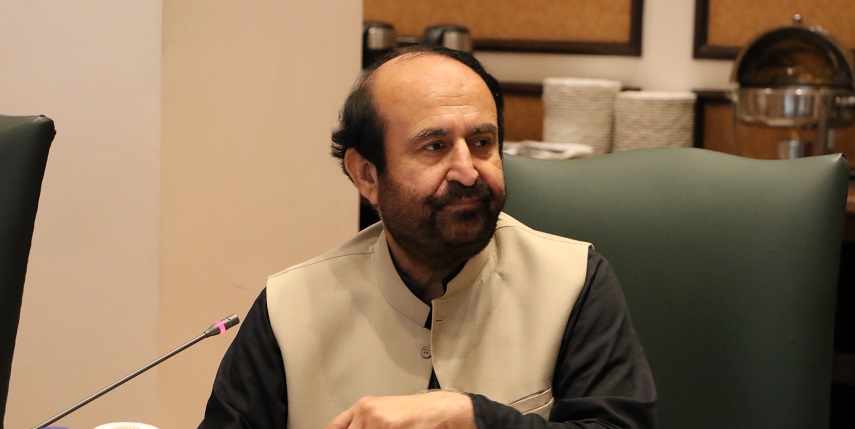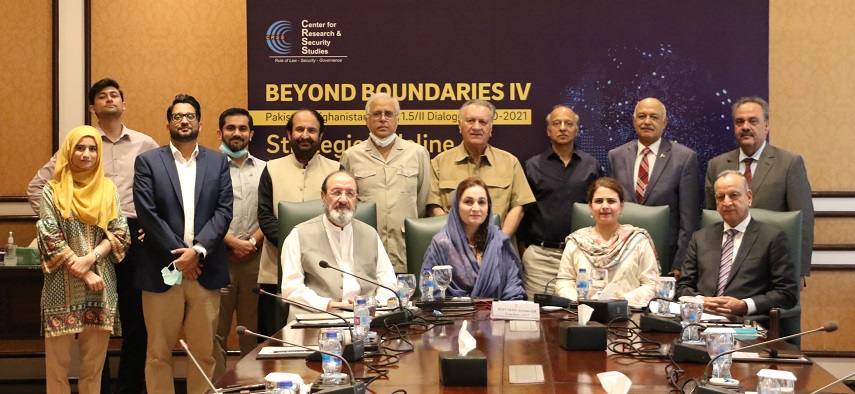As part of its efforts to improve Pakistan-Afghanistan relations under its ongoing Track 1.5/II initiative ‘Beyond Boundaries’, CRSS convened a strategic sideline meeting of the Pakistani PAJC members on August 17, 2020, at Serena Hotel Islamabad. The agenda of the meeting focused on i) COVID-19 pandemic’s shocking downturn in Pakistan, and its effects on bilateral issues, both political and economic, ii) The impact of the newly opened crossing points for bilateral and transit trade and the movement of people and goods, iii) Significance of the appointment of the Special Representatives for Pakistan and Afghanistan, how to best leverage this development and improve ties, iv) Ongoing developments in the Afghan peace process and intra-Afghan dialogue, potential outcome scenarios in the coming months, and their impact, and v) Security situation across Afghanistan and Pakistan leading into the tail end of 2020.
Members included Mehnaz Akber Aziz, Member National Assembly; Dr. Shoaib Suddle, Former IG Police and former Federal Tax Ombudsman; Lt. Gen. (retd) Asif Yasin Malik, Former Defense Secretary; Former Ambassadors Ayaz Wazir, Qazi Humayun, Asif Durrani, and Mian Sanaullah; Ammara Durrani, public policy and human security expert and Tahir Khan, senior journalist and anchorperson GTV News. CRSS was represented by Executive Director Imtiaz Gul, Beyond Boundaries’ project leader Zeeshan Salahuddin, CRSS Program Manager Junaid Khan, and CRSS Program Coordinator, Sitwat Waqar Bokhari.
Welcoming the members, Executive Director Imtiaz Gul presented an overview of the challenges being currently faced in bilateral relations and invited the members to share their insights on their resolution. One of the critical challenges, besides those arising from COVID-19 pandemic, that requires immediate attention and a policy appraisal, he stated, is the slow scanning of the containers, non-availability of trackers and the issue of insurance has led to the stranding of over 9000 trade containers. He demonstrated these challenges by sharing videos of Afghan traders at Torkham crossing point, acquired by CRSS the day prior, showing long queues of trucks carrying goods barred from going to their destination.
As a suggestion to resolve this matter, Member of National Assembly (MNA) Mehnaz Akber Aziz underlined the need to approach and utilize the parliamentary channel to effectively address this challenge. She suggested to meet the speaker of the National Assembly and brief him on the importance of the formation of a Special Parliamentary Committee that would address challenges faced not only in trade but also political and economic matters concerning both countries. As part of this, she suggested to conduct a series of meetings as lobbying efforts with relevant stakeholders involved in the process. This way recommendations and future policy strategies that evolve from such events can be tabled to them which could later merge with national policies. To form this committee, MNA Aziz suggested to apply the model of the CPEC Committee that she is a part, suggesting to focus on key issues and engage with relevant organizations for oversight through the parliament. She suggested that here CRSS could work as their think tank or secretariat.
Seconding her recommendation, Lt. Gen. (retd) Asif Yasin Malik stressed that Afghanistan is more important to Pakistan than Kashmir. Hence, creating a parliamentary committee should be the first step towards improving Pakistan-Afghanistan relations. Former IG Police, and former Federal Tax Ombudsman, Dr. Shoaib Suddle, was of the view that such a committee should have representation from all parties’ parliamentarians. Ambassador Ayaz Wazir stressed on the need that, as the nature of Pakistan-Afghanistan relations primarily affect Pashtoons and the communities living on the border areas, Pashtoons need to be a significant part of any such parliamentary committee, or else it would not succeed in achieving its objectives. Ambassador Mian Sanaullah added that while he endorses this view, the tribes living on the border areas are not the only stakeholders but rather improvement in Pakistan- Afghanistan relations concerns the whole country.
Ambassador Asif Durrani pointed out that what Afghanistan essentially requires from Pakistan is trade routes and Pakistan could use that as a point of strength for its benefits. There is a lot of power in trade, he said, and if Pakistan would not offer Afghanistan that, Afghanistan would look elsewhere to achieve that. This would also put Pakistan in loss, he said.
Emphasizing on the need to prioritize this as a matter of national concern, human security expert Amarra Durrani affirmed that working on avenues for regional economic connectivity was in the best interests of both countries. She stated that there is a need for Pakistan’s policy makers to formalize a comprehensive domestic policy narrative which can bring all domestic stakeholders on the same page and effectively achieve win-win outcomes on the trade front for Pakistan and Afghanistan. She added that, to achieve this, provinces should also be taken as stakeholders and a system of check and balances be created to ensure effective governance at all levels involved in this process.
Raising concerns regarding existing loopholes in governance, senior journalist Tahir Khan stated that there is rampant smuggling in the Pakistan-Afghanistan border areas where the Frontier Corps and the Police are involved, in addition to the District Commissioners. Ensuring that all these loopholes are removed would require massive political will and a systematic change of mindset.
MNA Aziz then stated that CRSS had been playing a very active role in conducting advocacy and lobbying through engaging with stakeholders over the course of the last few years. She suggested that CRSS should not only play an advisory role as a think tank by providing policy recommendations to the Government but also assist in its implementation. She stated that the Parliament focuses very little on Pakistan and Afghanistan relations and offered to present anything that members at CRSS’ forums devise in the shape of points of order, resolutions or calling attention notices.
She also expressed her concern over how Pakistan needs to make its role relevant again in the Afghan peace process, being a major stakeholder in the whole situation. Afghans, being always very good at negotiating, succeed in acquiring their interests while Pakistan is always the one that makes the compromise, she said. She stressed on the need for Pakistan to look out for its interests as well and stated that CRSS should identify a point of contact in the Foreign Office and Afghanistan through to whom they can share their policy recommendations with.
She also commended the ongoing efforts of CRSS during COVID-19 pandemic when most other organizations working towards such goals had gone on the back foot. She apprised the forum on the ongoing process of formulating a Women-Led Parliamentary caucus that CRSS is working on currently and offered to facilitate in arranging a meeting where the Speakers of the National Assembly and the Senate as well as the Foreign Minister are invited and briefed on all the objectives pursued and activities planned under the caucus. Once such efforts are picked up by the media, she said, there will be follow- up meetings in the Parliament and the Foreign Ministry, and tangible outcomes can then be pursued in an official capacity. She revealed that while the caucus includes women parliamentarians at the moment, the platform would not necessarily look at women-related issues but issues concerning both peoples and would include male parliamentarians in the future as well.
While speaking on the developments in the Afghan peace process, Ambassador Asif Durrani stated that the war economy in Afghanistan is very strong where many spoilers, such as the Afghan war lords, are greatly benefitting from a delay in the resolution of the Afghan conflict. Ambassador Qazi Humayun stated that there are many internal spoilers which would get diluted or lose power if the intra-Afghan dialogue succeeds. Ambassador Mian Sanaullah shared his concern that the Afghan peace process may never conclude to a resolution. He shared with the forum that the US has recently passed an Authorization Bill where it was decided that if the US troop count falls below 8,000 in Afghanistan, they would cease to be responsible for any financial aid for Afghanistan. This raises concern for the country as the Afghan government’s economy is highly dependent funds from the US and the international community.
Ammara Durrani raised another concern regarding what the security situation in the border areas will be like if the peace process concludes. She inquired the forum on their views on the Taliban’s take regarding border security and whether they would ensure that a spillover of terrorism does not occur seeing that IS and TTP still operate in Afghanistan.
Sharing his insights from interactions with close links of the Taliban, Tahir Khan revealed that the Taliban are now more than willing to move ahead in the Afghan peace process. However, the delay is currently being observed from the Afghan government’s side. He also shared that the TTP has announced that Jamaatul Ahrar has joined them again, demonstrating that the group is fighting for legitimacy, which presents various challenges for both Afghanistan and Pakistan.
At the end, the forum agreed on devising the next steps involved in creating the Special Parliamentary Caucus to deal with urgent issues in Pakistan and Afghanistan affairs, particularly bilateral and transit trade, and resolved to reinforce efforts in advocacy and lobbying to achieve the resolution of pressing bilateral challenges. In his concluding remarks, Executive Director Imtiaz Gul thanked all participants, and vowed to pursue the agenda of helping form the Special Committee on Afghanistan through concerted lobbying, meetings, and pressure groups.

